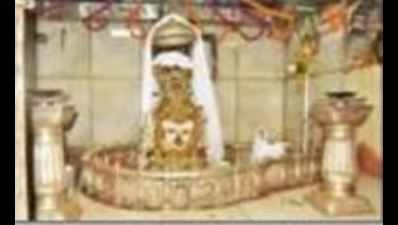- News
- City News
- lucknow News
- This Saavan, watch city's bhasma aarti live on web
Trending
This story is from July 15, 2016
This Saavan, watch city's bhasma aarti live on web
The bhasma aarti on Lord Shiva at Maha Shiv Mandir in Rajendranagar would be webcast live during the month of Saavan this time.

The bhasma aarti on Lord Shiva at Maha Shiv Mandir in Rajendranagar would be webcast live during the month of Saavan this time.
Lucknow: The bhasma aarti on Lord Shiva at Maha Shiv Mandir in Rajendranagar would be webcast live during the month of Saavan this time.
The temple claims to be the only one in the state to perform the bhasma aarti as it is done at the Mahakaleshwar Temple in Ujjain. This aarti is performed with sacred ash or bhasma.
A committee from the temple, which has begun online bookings of the bhasma aarti, returned from Ujjain on Thursday.
Taking to reporters, chief priest Atul Mishra said that devotees who cannot go to Ujjain come to this 60-year-old temple in the city for the bhasma aarti. The live webcast of the aarti would allow people to take a look at the ritualistic aarti which will be held on all Mondays of Saavan slated to begin on July 19. "Bhasma aarti is believed to be the ultimate ritual to please Lord Shiva," said Mishra, adding, "The ritual is all the more auspicious in the month of Saavan when devotees contribute whatever they can to relieve the deity of his thirst and burning."
Bhasma aarti rids people of their sins, Mishra said. The temple administration claimed that they ensure that the rules for the aarti fixed by Mahakaleshwar Temple in Ujjain are followed in letter and spirit. Chief priest Pandit Ram Bihari Dwivedi said, "We have brought 'bhasma' (ash) from Ujjain to maintain the sanctity of the ritual."
The temple claims to be the only one in the state to perform the bhasma aarti as it is done at the Mahakaleshwar Temple in Ujjain. This aarti is performed with sacred ash or bhasma.
A committee from the temple, which has begun online bookings of the bhasma aarti, returned from Ujjain on Thursday.
Taking to reporters, chief priest Atul Mishra said that devotees who cannot go to Ujjain come to this 60-year-old temple in the city for the bhasma aarti. The live webcast of the aarti would allow people to take a look at the ritualistic aarti which will be held on all Mondays of Saavan slated to begin on July 19. "Bhasma aarti is believed to be the ultimate ritual to please Lord Shiva," said Mishra, adding, "The ritual is all the more auspicious in the month of Saavan when devotees contribute whatever they can to relieve the deity of his thirst and burning."
According to the legend of 'Samudra Manthan' (churning of the ocean), in the battle between gods and demons, Shiva had to swallow an extremely powerful poison called Halahal that made him suffer intense heat. To neutralize the poisonous effect, Shiva drenched his body with cold water. Devotees, to this day, pour water and milk on the Shivalinga in the rainy season to 'relieve' the deity.
Bhasma aarti rids people of their sins, Mishra said. The temple administration claimed that they ensure that the rules for the aarti fixed by Mahakaleshwar Temple in Ujjain are followed in letter and spirit. Chief priest Pandit Ram Bihari Dwivedi said, "We have brought 'bhasma' (ash) from Ujjain to maintain the sanctity of the ritual."
End of Article
FOLLOW US ON SOCIAL MEDIA










